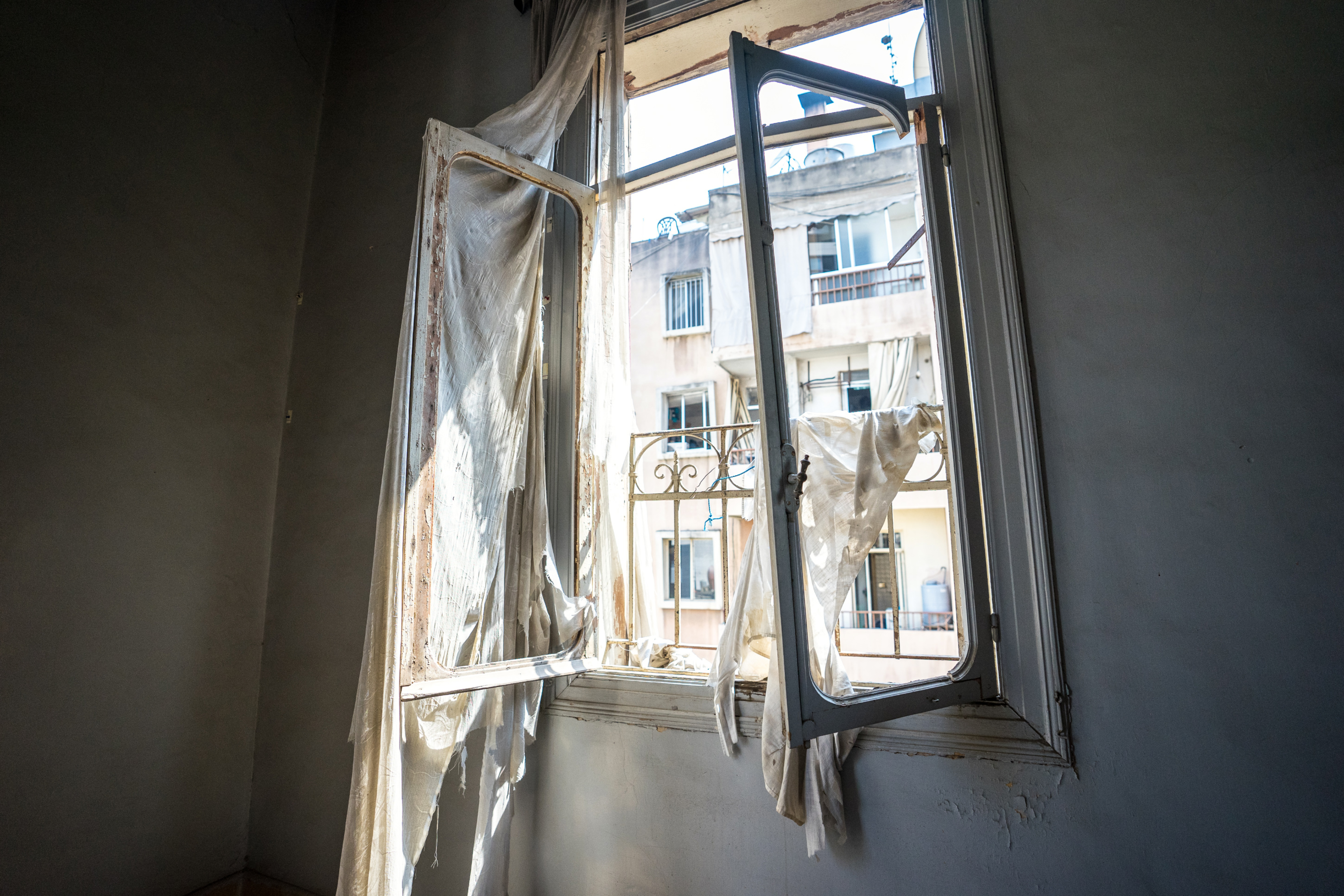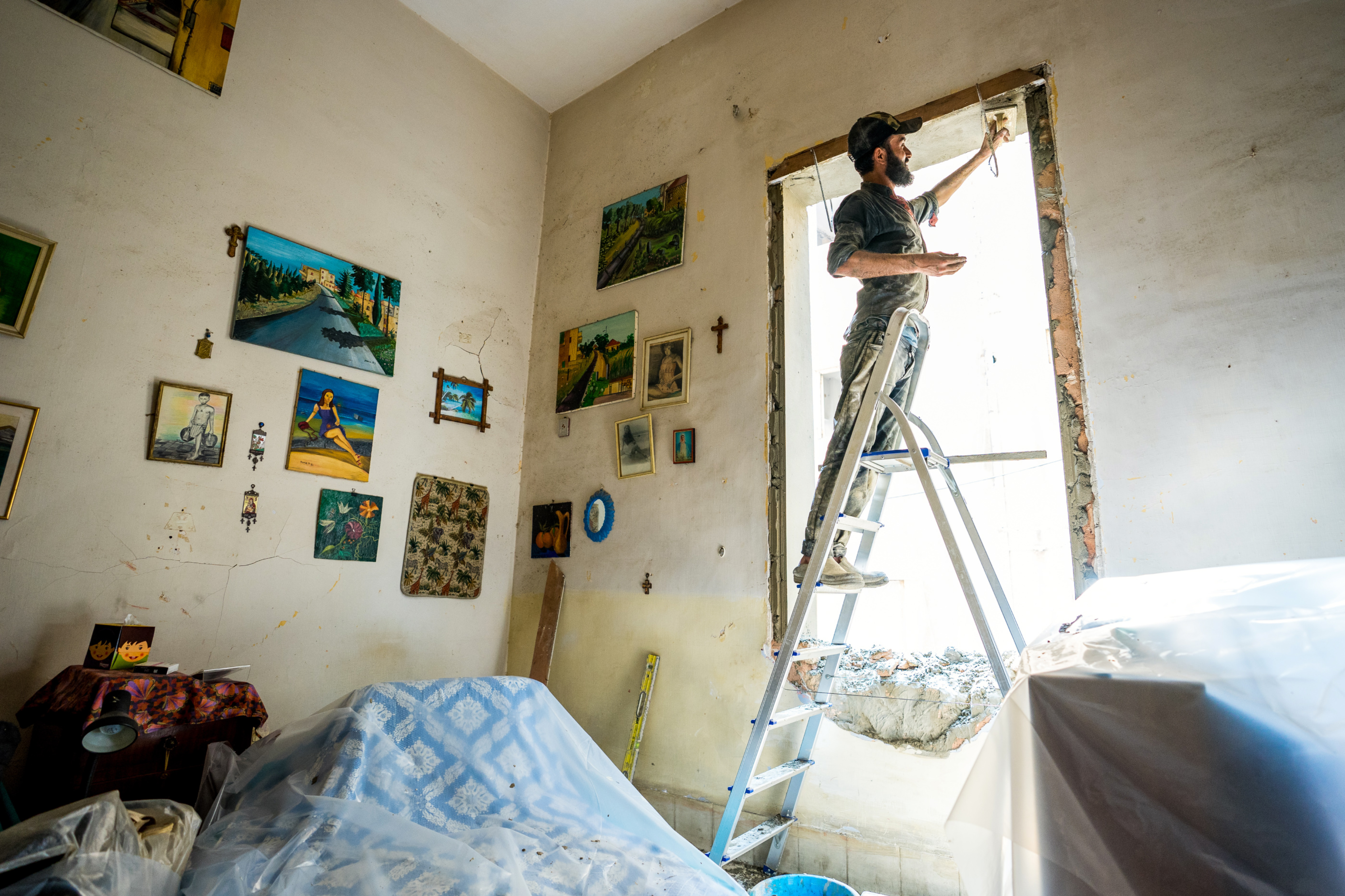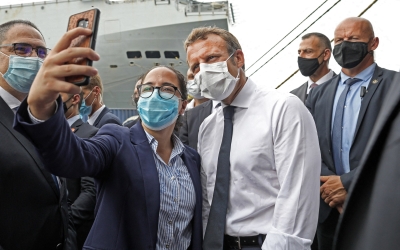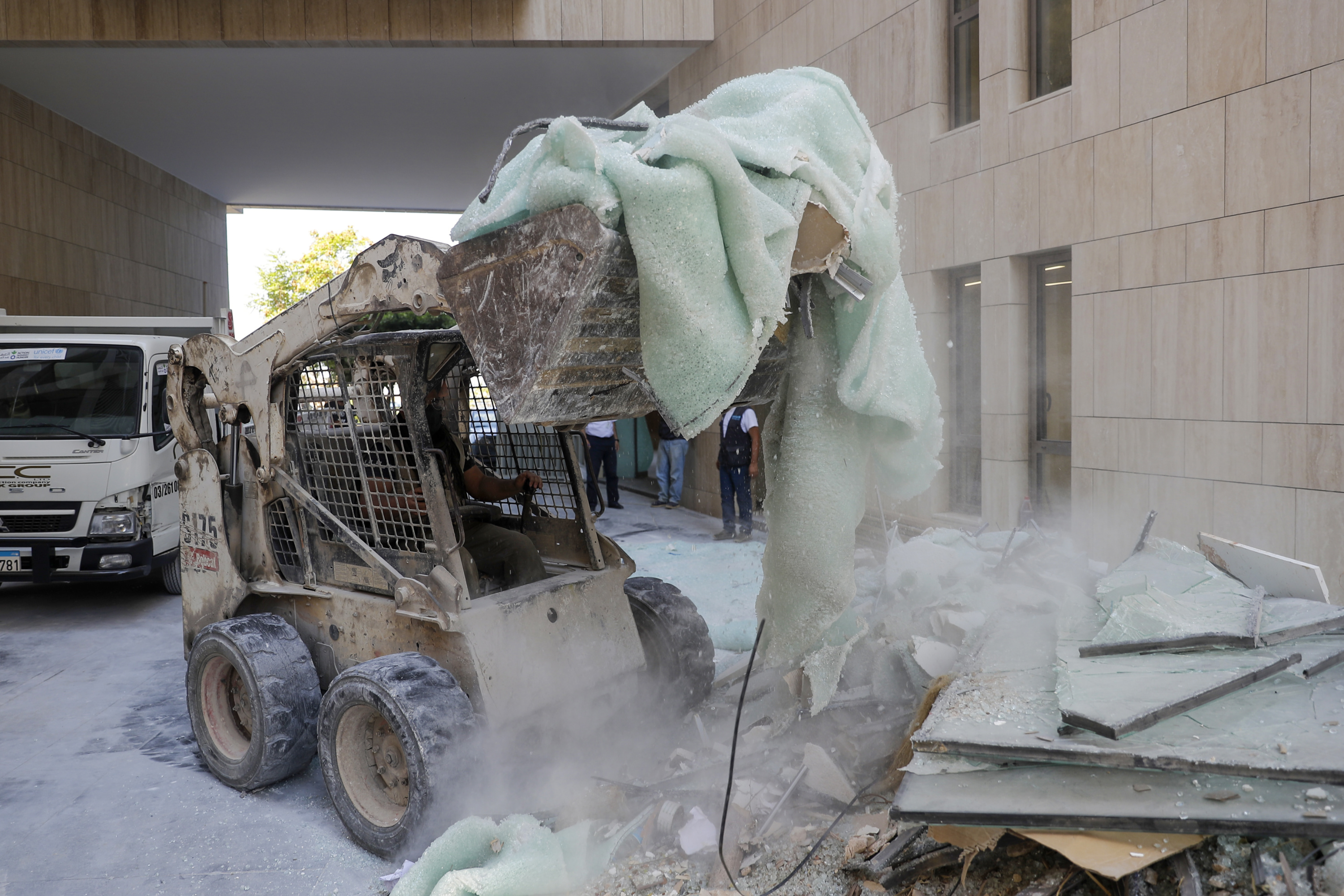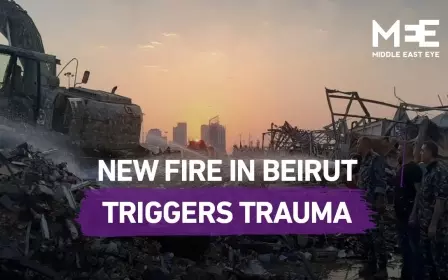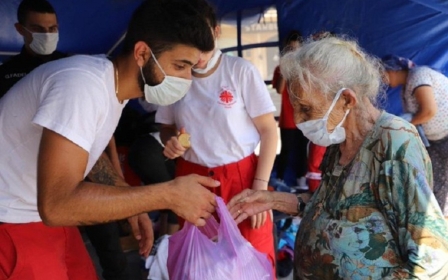Beirut explosion: Survivors struggle alone to repair and rebuild
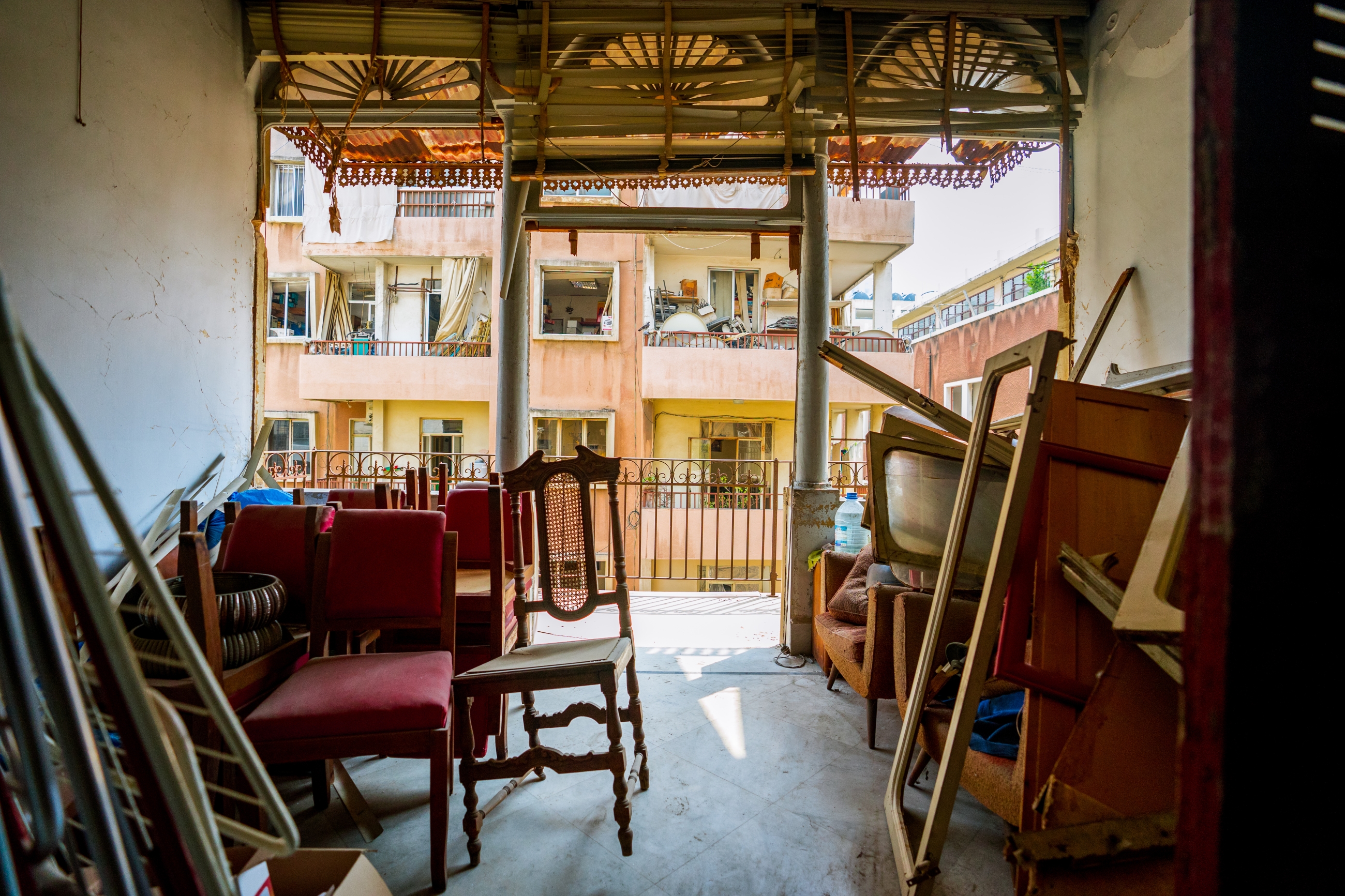
Many residents in the Lebanese capital are still struggling to repair their homes, more than a month after an explosion at the Beirut port ripped through the city, causing widespread damage to the surrounding area.
"The army came yesterday and gathered information for a second and final time, and they're saying they will pay for the windows soon," Ramzi Dalal told Middle East Eye, standing under the blistering sun by his home near Gemmayze Street, one of the neighbourhoods that were badly damaged on 4 August.
New MEE newsletter: Jerusalem Dispatch
Sign up to get the latest insights and analysis on Israel-Palestine, alongside Turkey Unpacked and other MEE newsletters
"The NGOs are also coming and asking for names and making us fill forms and applications so they could send emails - about seven or eight organisations came."
That being said, unable to wait longer, the unemployed 27-year-old opted to spend whatever money he has to start fixing his home.
Empty words and empty promises: a theme all too common in broken Lebanon.
"We couldn't wait anymore," said Dalal, who still hasn't been able to replace his windows. "I have to wait to see what I can do… we can't run out of money all at once."
For now, he has opted to tape plastic sheets over the shattered window as a temporary fix.
Dalal's home is one of at least 50,000 damaged by the Beirut blast, according to government numbers. The devastating explosion killed almost 200 people, wounded 6,500, and left 300,000 homeless.
But on top of the explosion's devastating impact is the country's crippling economic crisis, which, according to the United Nations, has left a staggering 55 percent of the population living in poverty. At the same time, the devaluation of the local currency over the past 11 months, by roughly 80 percent, has pushed the price of many items, particularly those imported by Lebanon, including glass, to skyrocket.
'Look at this window'
For many residents of the hardest-hit neighbourhoods with working-class populations, notably Karantina and some districts in and around Gemmayze, the repair costs - with virtually no support - go well beyond their budgets.
'If someone had been laying down on this bed, they wouldn’t have stood a chance'
- Elide Wardini, resident
Retiree Elide Wardini, who spends her time looking after her grandchildren, was luckily not home when the explosion took place.
"Look at this window," she told MEE, pointing to a wall filled with holes from the shattered glass.
"If someone had been laying down on this bed, they wouldn't have stood a chance." Each window has cost around 800,000 Lebanese pounds (LL), just over $100, to fix - eight times more expensive than it would have been less than a year ago.
Oxfam last week said that it can now cost people up to $500 to replace a broken window, while a front door can cost up to two months' pay for a minimum wage worker. Lebanon's minimum wage is LL675,000 per month, which used to be worth $450 before the devaluation of the lira. Now, it is worth between $86 and $96.
Thanking God for protecting her, Wardini was full of praise for young volunteers who helped clean damaged homes on her street.
"They didn't do it to prove anything; it was simply out of solidarity," she said. "The bulk of the dirty work that was done around the city was done by the young volunteers."
However, she was critical - almost heartbroken - at the lack of an effective response from the state, the army, and many NGOs.
The Lebanese government has been slow to effectively mobilise to help repair homes or provide financial assistance.
It did however collect glass, metal, and rubble from damaged structures and place them in piles in empty lots, in what appears to be another ironic case of negligence and incompetence. Considering the various chemical compounds that caused the explosion, including 2,750 tons of ammonium nitrate, Greenpeace programme manager Julien Jreissati says residents are once again put at risk.
"The rubble is unsorted and unassessed - we've discovered asbestos," Jreissati told MEE. "God knows what was in the port and what exactly blew up."
In addition to "potentially hazardous waste" coming in close contact with residents, the shards of glass left in the piles are a risk on their own.
"It can create fires if disposed near green areas," Jreissati said.
'Wishful thinking'
Entrepreneurs, factories, volunteers and organisations have taken on initiatives to salvage and repurpose the glass.
One such plan was undertaken by Green Glass Recycling Initiative-Lebanon (GGRI), by diverting the glass from already overloaded landfills to struggling glass industries.
The group estimates that around 5,000 tonnes of window panels were shattered in the explosion and not properly collected.
Recyclable glass they collected was delivered to glassblowers who reproduced a wide variety of household items for sale. As of 3 September, a month after the explosion, they had already recycled almost 58 tons.
A partner of the initiative, environmental engineer Ziad Abichaker, said there had been a significant "lack of planning" in these city affairs.
"If you have 50 pickup trucks, you wouldn't just have them collect everything," an indignant Abichaker told MEE. "[They should] designate some to collect the rubble, and others to pick up aluminium, glass and wood."
But, he said, his idea was just "wishful thinking".
Abichaker said the benefits could be manifold, as different sides try to make use of reusable materials.
"All you will end up with is the rubble and the glass - which we will take."
In the meantime, however, people unable to rebuild their homes and fix their windows need immediate support. While initiatives such as Abichaker's are helpful, time is of the essence for many residents.
Back near Gemmayze, Wardini was not only critical of state services, but also of several non-governmental organisations, which she said had been ineffective in supporting people at their most vulnerable.
The plethora of campaigns and fundraisers, compared with the lack of effective action on the ground, has left her more than sceptical.
"You know, it's not what people say broadly; it's what people don’t say," a pensive Wardini told MEE. "It seems like these NGOs are choosing whose houses to fix, and I don't think it's fair."
Middle East Eye delivers independent and unrivalled coverage and analysis of the Middle East, North Africa and beyond. To learn more about republishing this content and the associated fees, please fill out this form. More about MEE can be found here.


